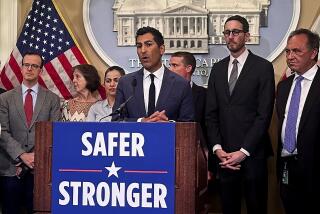Stiffer Penalties Approved for Getaway Drivers : Courts: Divided state justices rule that people who help robbers flee can be held equally responsible for the crime.
- Share via
SAN FRANCISCO — Despite a sharp dissent, a closely divided state Supreme Court on Thursday approved stiffer criminal penalties for the drivers of “getaway” cars and others who help escaping robbers.
The justices held 4 to 3 that a person who helps the actual robber flee to a safe haven may be held equally responsible, even without proof that the driver had prior knowledge of the crime.
The court, in a case involving the mugging of an 89-year-old Orange County man, said a driver in such cases may be considered an “aider and abettor”--rather than merely an accessory after the fact--and subject to the same punishment as the robber himself.
“The commission of the crime of robbery is not confined to a fixed place or a limited period of time and continues so long as the stolen property is being carried away to a place of temporary safety,” Chief Justice Malcolm M. Lucas wrote for the majority.
In dissent, Justice Joyce L. Kennard, joined by Justices Stanley Mosk and Allen E. Broussard, accused the court of diverting from a century-old legal doctrine calling for lesser penalties for those who only help the robber after the actual crime has been committed.
“(The decision) will lead to absurd results because criminal liability will bear little or no relationship to the culpability of the offender,” she wrote.
Kennard said it now was theoretically possible that a person who helps in the escape of a robber who has killed his victim could be charged with first-degree murder under the felony-murder rule.
State Deputy Atty. Gen. Laura Whitcomb Halgren welcomed the ruling, noting that getaway drivers often play key roles in robberies. Frequently, she said, such persons seek to avoid heavier penalties by claiming they knew nothing about the crime until after it occurred.
“Any time you extend criminal liability, the theory is that it will deter criminal acts in the future,” Halgren said. Under law, robbers--including those who aid and abet them--are eligible for prison terms of up to six years. By contrast, an accessory after the fact is subject to one year in jail.
Richard Schwartzberg of Santa Ana, attorney for the defendant in the case, voiced disappointment, saying the ruling “makes no sense.” He noted that by extending criminal liability, a driver now not only faced a stiffer penalty for the immediate offense but, as a convicted robber, an enhanced punishment for any future crime.
Schwartzberg said that while the court’s ruling concerned robbery, its reasoning might be imposed in other cases. “What frightens me most is that the ruling may serve as a signal to lower courts to start applying this same concept in other kinds of crimes,” he said.
In other action Thursday, the justices:
* Upheld the death sentence of Earl Preston Jones in a 1982 double murder in Los Angeles. The ruling in a 6-1 vote marked the 30th consecutive capital sentence the court has affirmed--and the 100th affirmance since conservatives took control after the 1986 election defeat of Chief Justice Rose Elizabeth Bird and two other court members. Since then, the court has reversed 27 death sentences, by unofficial count.
Jones, 56, was convicted of the shotgun murders of Charles Rambert and Patricia Khan, tenants in a house Jones owned in Sun Valley.
* Refused to reconsider their ruling last May striking down religious invocations at public high school graduation ceremonies. The constitutionality of such prayers will be reviewed by the U.S. Supreme Court in the term beginning next October.
State Atty. Gen. Daniel E. Lungren had joined attorneys for the school district in the case in asking the state court to withdraw the May ruling and rehear the issue after the federal high court rules in the other case.
The robbery case arose in April, 1988, when, according to authorities, Larry Cooper drove two other men to a Garden Grove shopping center and parked the vehicle. According to witnesses, Cooper remained near the car while the two others ran toward Oral Ogilbee, 89, knocked him to the ground and stole his wallet.
The pair fled to Cooper’s car, which was moving with the passenger doors open, and left the scene. Later, all three were arrested and charged with robbery. At the trial, Cooper contended there was insufficient proof he had prior knowledge or intent to commit the robbery.
An Orange County Superior Court jury convicted all three defendants of robbery, with Cooper receiving a suspended sentence of probation and a one-year jail term.
More to Read
Sign up for Essential California
The most important California stories and recommendations in your inbox every morning.
You may occasionally receive promotional content from the Los Angeles Times.










